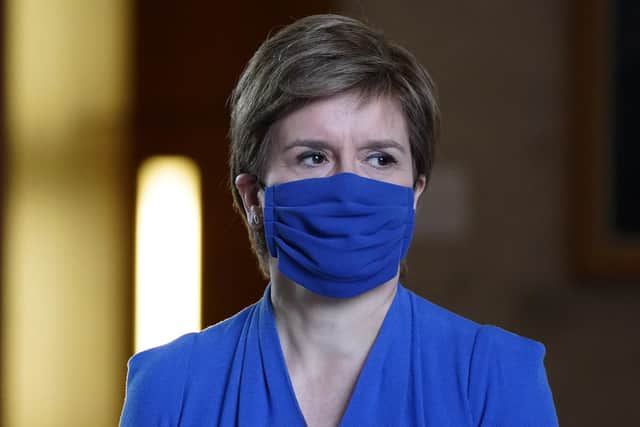Omicron Scotland: Why is the new Covid household limit guidance, rather than law?
For example, mask wearing was initially advised before later being made mandatory, while limits on socialising were written into law during 2020 ahead of the second lockdown.
This resulted in a high number of regulations – from travel restrictions, to self-isolation mandates, to vaccine certification – for which Nicola Sturgeon saw fit to need enforcement.


Advertisement
Hide AdAdvertisement
Hide AdThousands of fines under Covid regulations followed, but Tuesday’s announcement from the First Minister of limiting mixing to a maximum of three households was described as “strong guidance”, and is not law.
Ms Sturgeon said: “Although it is guidance, please do not think of it as optional.”
This apparent contradiction was criticised by high-profile lawyer and dean of the Faculty of Advocates, Roddy Dunlop, on Twitter.
The QC tweeted: “At some point, I am sure [the Scottish Government] will explain the concept of guidance (ex hypothesi not law and thus not enforceable unless incorporated into regulations) that is ‘not optional’.”
He later added: “But in a world where we are repeatedly told that clear messaging is important, the use of an oxymoronic ‘non-optional guidance’ doesn’t seem to me itself to be particularly helpful.”
It’s a fair point, but one that is likely explained by the clear Covid fatigue that permeates society.
No-one wants more restrictions and it would be politically damaging to be the first politician to initiate a return to the restrictions of late December 2020.
Choosing guidance over law means the message can be heard and, hopefully, enough people following it voluntarily, without the same consequences of fully enforcing restrictions.
Advertisement
Hide AdAdvertisement
Hide AdPerhaps more relevant was the First Minister’s admission that more restrictions would have been brought in had the funding been available.
What these would be is not clear, but it demonstrates a reluctance within the Scottish Government of going beyond England despite the public health arguments.
That has also been a pattern of the pandemic, with Ms Sturgeon finding it easier to move more quickly when the same is happening in England.
Similarly when exiting lockdown, she has taken longer to move towards more freedoms.
This delay is a political gamble, but Omicron may eventually force the hands of all of the UK’s leaders.
A message from the Editor:
Thank you for reading this article. We're more reliant on your support than ever as the shift in consumer habits brought about by coronavirus impacts our advertisers.
If you haven't already, please consider supporting our trusted, fact-checked journalism by taking out a digital subscription.
Comments
Want to join the conversation? Please or to comment on this article.

